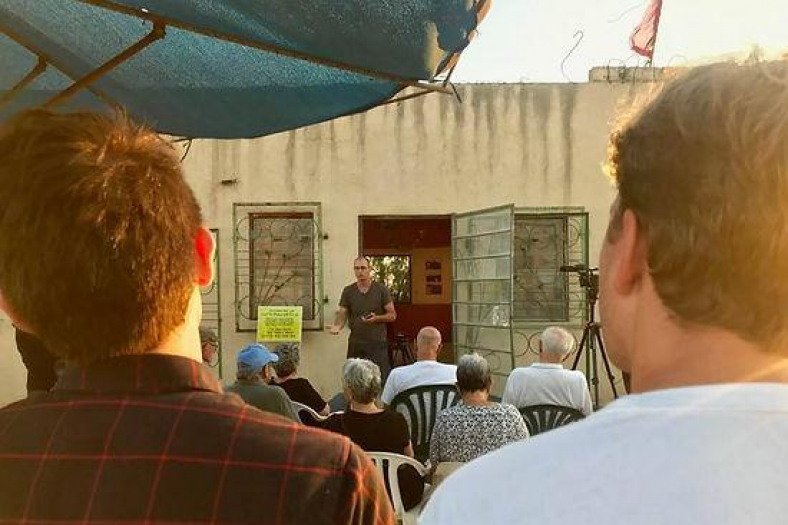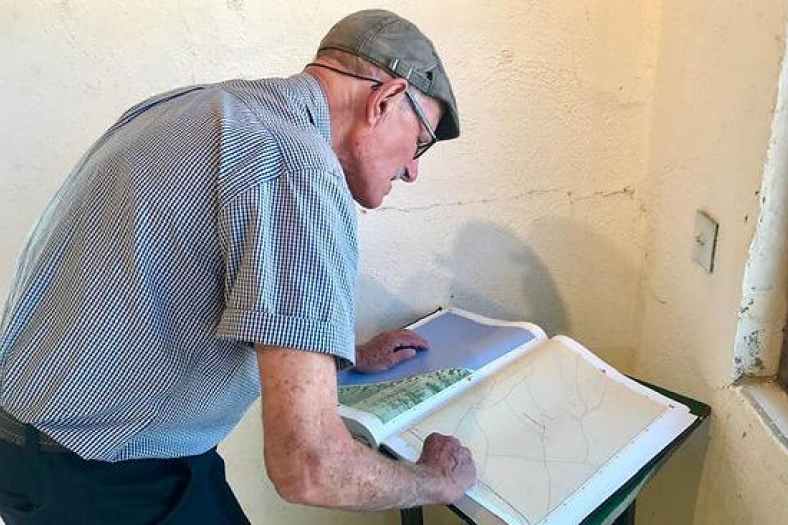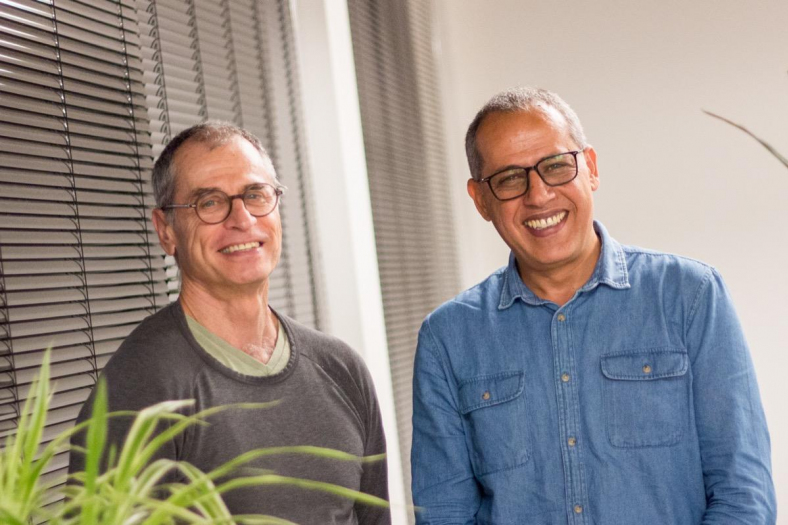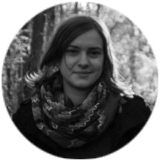Where does the violence in the Middle East end? ‘This is colonialism that is becoming more extreme’

© Reuters / Ammar Awad
How should we understand this new chapter in the Israeli-Palestinian conflict? When and how will the violence end? And what role should the international community play? MO* spoke to anti-colonial activist Eitan Bronstein Aparicio and human rights expert Mahmoud AbuRahma.
Translation of this article is provided by kompreno, using a combination of machine translation and human correction. More articles from MO* are included in kompreno‘s curation of the finest analysis, opinion & reporting — from all across Europe, translated into your language. Original source.
It is clear from the cordial greeting between Israeli Eitan Bronstein Aparicio and Palestinian Mahmoud AbuRahma that this is not their first meeting. They immediately ask each other how family and friends are doing.
Exactly one week before the deadly Hamas raid, AbuRahma returned to Belgium after visiting his family. Today, he says, they are just trying to survive. ‘It takes my brother eight hours to find water and food for his children.’
AbuRahma lives in Belgium with his wife and kids since 2016 — out of necessity, because of serious threats related to his research for the Al Mezan Center for Human Rights into violations of international humanitarian law, war crimes and human rights abuses in Gaza. Research that was submitted to the International Criminal Court in The Hague. Since 2020 he has been working for the European Network Against Racism.
Bronstein Aparicio knows some of the victims and hostages from the kibbutzim. Like Haim Peri, a peace activist from the Nir Oz kibbutz, who was kidnapped to Gaza. Like Yocheved Lifshitz, one of the hostages released by Hamas, Peri volunteers with The Road to Recovery. This organisation transports Gazans from the Eretz border crossing to hospitals, where they receive medical treatment not available in Gaza, such as cancer treatment.
This is only possible if Israel grants Gaza patients a permits allowing them to leave Gaza. AbuRahma’s work at Al Mezan included helping patients obtain these permits. ‘If they are not granted in time, or if the application is rejected, consequences for them are serious, often fatal.’
Today Bronstein Aparicio lives in Belgium with his family as well. They are among a growing number of Israelis who have decided to leave. ‘Like me, my wife Eléonore Merza, who is French and a co-founder of De-Colonizer, has was always been anti-Zionist and anti-colonialist. She moved to Israel to be with me. I grew up in that country. So I am used to its highly militarised, racist and nationalist society. But she found it too difficult to settle there.’

© Eléonore Merza
In 2019, Bronstein Aparicio organised an exhibition in the art gallery of the peace activist Peri. Among the visitors were Lifshitz and other residents of the kibbutzim around Gaza. Together with Palestinian videographer Musa’ab Bashir, Bronstein Aparicio portrayed the history of the Palestinian village of al Ma’ineh. He did this partly through the testimonies of Palestinian refugees from the village who now live in Gaza and have not been able to return since 1948.
It is no coincidence that the gallery is located in the last remaining house of al Ma’ineh, a stone’s throw from the Gaza Strip. For some residents of the surrounding kibbutzim, this was the first time they had heard bout the history of the village and the land on which they live today.
Such forms of remembrance education are central to Bronstein Aparicio’s activism and work. With the organisation Zochrot (“memories”), of which he was director until 2011, he mapped the history of the countless Palestinian villages that were cleansed in 1948. Since 2015, he has continued this work with De-Colonizer, a research and art laboratory dedicated to ‘a future beyond colonialism and racism, with equality for all’.

‘Restoring deterrence’
Among the victims and hostages of the Hamas attack there are also Israeli peace activists. Is there a before and after of 7 October? How will this affect relations between peace activists who were themselves victims and Palestinians?
Eitan Bronstein Aparicio: This is an earthquake. My family is also going through an unprecedented crisis. One of my sons is calling the other a Nazi because he suggested something like not bombing Gaza or not expelling people.
But even in the families of hostages or people who have been killed, these voices are still there. Like the father who wore a T-shirt of one of the anti-occupation movements at his son’s funeral. As he mourned his son, he spoke out strongly against the occupation and the bombing of Gaza. Actually, hardly anyone says this, except for a few brave voices.
Mahmoud AbuRahma: Gazans are too busy surviving now, but before 7 October they were very angry about the way Hamas was running Gaza. It was asking too much of an exhausted population, renegotiating with Israel over things like work permits or fuel. This made it look as if Hamas had become an agent of Israel, governing a besieged population. It made people desperate because no one, including the Palestinian Authority in the West Bank, could counterbalance it.
The scale of the Israeli response is now intended to be so painful that people will be traumatised for a long time and will never think of resisting. Israeli officials and the media even talk explicitly of ‘restoring deterrence’. When this is done with the full approval of the international community, it creates a sense of great helplessness. That international law means nothing, and there is no one to protect you.

Eitan Bronstein Aparicio and Mahmoud AbuRahma
© Charis Bastin
Will there still be a middle ground? Will it still be possible to talk?
Mahmoud AbuRahma: The 1970s and 1980s were the only two decades when Israelis and Palestinians met in relatively normal circumstances. Israelis came to Gaza to eat fish and go to the beach. And to build some settlements. Some 200,000 to 300,000 Gazans worked in Israel. Until 1987, when the first intifada began — the Palestinian uprising in the Israeli-occupied territories.
The 1990s were the years of the peace process, but also of the closure and demarcation of the land that Israel wanted to colonise and annex. There was never any real intention of creating a truly independent Palestinian state.
Under Ehud Barak (then a member of the centre-left Labour Party and Israeli prime minister from 1999 to 2001, ed.), settlement expansion in East Jerusalem and the Jordan Valley boomed. This happened while he was negotiating with Yasser Arafat (then president of the Palestinian Authority, ed.). What is there to talk about when Israeli society is almost entirely united in its view that Palestinians do not exist and should be subjugated?
Eitan Bronstein Aparicio: For a long time, the left in Israel was able to maintain the lie that it wanted peace. But it is the left that started the Nakba (the expulsion of Palestinians from their territory in 1948, ed.). They sold us, the Israelis, and the world, that lie. The right is honest: Palestinians are completely abandoned and neglected.
This is the direction that Bezalel Smotrich set out in a “submission plan” in 2016. (Smotrich is now finance minister in Netanyahu’s right-wing government, ed.) It is about the total annexation of the West Bank. Palestinians have a choice: emigrate with our help, as we give them money and new skills to make it easier for them to leave, or stay in their own little “municipalities,” with self-government but, of course, no political rights.
Smotrich had declared earlier that Hamas was an asset to Israel. The idea was to weaken the Palestinian Authority (which governs in the West Bank, ed.) and strengthen Hamas. In Gaza, after all, Hamas is in its big prison and cannot be dangerous — or so he thought.
All eyes are now on Gaza, while what is happning in the West Bank is far too invisible.
Eitan Bronstein Aparicio: Yes, the violence there is enormous. Especially from the settlers.
Mahmoud AbuRahma: Repression is the norm in the West Bank. It’s not just Smotrich’s plan. As I said, it started under Ehud Barak, in the middle of the peace negotiations, and then under Ariel Sharon.
Sharon’s Disengagement Plan of 2004 was welcomed by the whole world when the 8,000 settlers left Gaza. But read the rest of that plan: it talks about the siege of Gaza without an end to the occupation and the expansion of settlements in the West Bank. This is literally what it says.
An adviser to Sharon, Dov Wesiglass, said openly: ‘We’re putting the peace process in formaldehyde, we’re freezing it. That’s how you prevent the creation of a Palestinian state’. Netanyahu continued this process. He wanted to keep Gaza closed with a minimal humanitarian lifeline, which was approved by the Israeli Supreme Court.
Gaza had to be separated from the rest of Palestine. It had to be kept strong enough to govern itself, but not too strong to pose a challenge to Israel. And every now and then Israel had to ‘mow the lawn’.
There have been at least five wars against Gaza since the blockade was imposed in 2007. Will this be another in that long line, or is it a completely new chapter?
Mahmoud AbuRahma: This is a new chapter. This level of brutality is irreversible. I think Hamas was surprised at how easily things went on 7 October. That there seemed to be no second line of defence. Then it seems that unethical decisions were made that led to the massacre of civilians, even if we don’t know all the details of each case.
Eitan Bronstein Aparicio: How do you explain this? Is it the anger of the oppressed?
Mahmoud AbuRahma: Partly, yes. But it is also partly personal. It is revenge. Many have seen their families killed unjustly. People understand that fighters die in battle. But when it happens indiscriminately, when it is their home and their children, people are angrier.
‘The only appropriate attitude is to condemn all killings of civilians and to take action to prevent and punish the perpetrators.’
What happened on 7 October was brutal. But the idea that this is the starting point is ridiculous. The lack of outrage at all the previous killings and suffering, without any acknowledgement. The only appropriate attitude is to condemn all killings of civilians and to take action to prevent and punish the perpetrators. But this is not happening. This makes people angry, because the outrage is only there when certain people are affected.
Eitan Bronstein Aparicio: It is incredible how the Israeli mainstream media manages to hide certain testimonies. Like the testimonies of Israelis who say that they were not treated so brutally by Hamas. The Israeli government now hates Lifshitz’s testimony, which highlights the good treatment she received from Hamas members
Implosion
Could the anger in Israel against Netanyahu and his government not be translated into dissatisfaction with the occupation, the blockade or the ongoing conflict?
Eitan Bronstein Aparicio: No, anything but. Right now there is a lot of unity in Israel, there is no opposition. During the protests of the last months, one of the arguments against the fascist government was that members like Bezalel Smotrich or Itamar Ben Gvir (Minister of National Security, ed.) never served in the army. In other words, they were not patriotic enough. Many will now say that Ben Gvir and Smotrich were right. That this is ‘the way forward’.
‘I believe that this project of a Jewish state will implode. A very dramatic change is coming.’
I believe that the project of a Jewish state will implode. It is hard to imagine now because the support from the West is so great, but a very dramatic change is coming. There is a wider movement of Israelis leaving. There will undoubtedly be more reasons now.
How long can you stay and raise your children in a situation like that? In a system that is not going to change or suddenly say, ‘OK, now we want peace’. This is a form of colonialism that is becoming more and more extreme. The only way to stop this violence is with a lot of international pressure, whereas now we see that Israel is getting a lot of support. There is no chance of change from within.
You put a lot of responsibility on the international community. What kind of solution can it put first? Is facilitating a new peace process, starting from scratch, even an option?
Mahmoud AbuRahma: Part of the anger stems from the fact that the PLO (the Palestine Liberation Organisation, which morphed into the Palestinian Authority during the peace process, ed.) gave up everything. It opened up great diplomatic and economic opportunities for Israel by signing the bad peace agreement. That agreemed failed to bring a just end to the occupation.
The international community, too, has long since given up and has been funding the occupation for years. But much was promised with the peace process. It seems that the world has become accustomed to the fact that there is a kind of hierarchy of human value: some people are worth more than others.
‘It seems that the world has become accustomed to the fact that there is a kind of hierarchy of human value: some people are worth more than others.’
But clear signals are echoing around the world. Thousands of people have taken to the streets for the Palestinian cause in recent weeks.
Eitan Bronstein Aparicio: In a Jewish Voice for Peace action in the US Congress, some 300 people were arrested. These voices also exist in Israel, but they are treated harshly, and it is quite dangerous. The journalist Israel Frey was physically attacked because he dared to say on television that a massacre was taking place in Gaza. We hardly hear those voices here.
Mahmoud AbuRahma: More than ever, we also feel that anti-Palestinian racism is on the rise in most EU member states. In May, for example, Germany prevented any commemoration of the Nakba.
Of course, Germany has a special history.
Mahmoud AbuRahma: A few years ago, such commemorations were still possible. The same thing happened in France: in 2021 and 2022, during the bombardment of Gaza, all demonstrations were prevented. There are lawsuits, people lose their jobs, you name it. Palestinians feel they are in danger. Even my daughter was harassed on the train last week for wearing a keffiyeh (the typical Palestinian headscarf, ed.).
I am particularly worried that any criticism of Israel will be seen as pro-Hamas. I have heard hundreds of Palestinians condemn the killing of civilians. They see that any Arab or Palestinian commentator must first make the statement that they condemn Hamas’ actions, on all media. Israelis are not held to the same standard at all.
That’s why we need these voices on the right side of the story. Jews on the left, for example. Many of them are not heard, and they are the ones that need to be heard.
Eitan Bronstein Aparicio: In the end, it is not a question of condemning or not condemning. As human beings, we have to hold on to human values. At the same time, you cannot reduce Palestinians to mere victims of their oppressor either. Palestinians have also shown incredible ways of (peaceful) resistance.
Like the March of Return that started in March 2018? Until the end of 2019, Gazans marched to the border fence to demand an end to the blockade and the return of refugees. Nearly 200 demonstrators died in the process as a result of the Israeli army’s response.
Eitan Bronstein Aparicio: Yes, but also much earlier! The first Intifada was amazing.
Mahmoud AbuRahma: And even before that. In my childhood, our resistance was cleaning up the streets. At that time, there was no international opposition to the occupation, which was called as a ‘humane’ occupation. We organised ourselves by improving education and learning our history — which was forbidden in school. These forms of resistance still exist today.
But our experience is one of constant dehumanisation: ‘You don’t exist. You don’t count.’ It is easy for Israel to imprison and torture people. I was tortured and shot twice before I was 18. You see Israel dispossessing people and robbing them of their human dignity on both sides of the Green Line (the armistice line agreed in 1949, ed.). Or take the Nation-State Law, which explicitly deprives us of our right to self-determination.
Eitan, you call this conflict settler colonialism, but you also grew up in that society. Is that something you still identify with, or have you somehow broken out of it?
Eitan Bronstein Aparicio: I cannot deny that a part of it still exists in me. I speak Hebrew, it’s my mother tongue. I think I’m in a constant struggle, it’s a constant process. But after four years in Belgium, I can also say that it is easier to see the bigger picture and understand how insane it is.
‘It was a liberating process, the realisation that I could be a proud Jew.’
In Israel, I understood that I was Jewish in the sense that I was on the side of the oppressor. But that is not really being “Jewish.” Now I realise that I was so far away from my Jewish identity because Judaism in Israel is embodied in state nationalism and racism. Only by being here in Belgium did I discover that there is a Judaism that is not connected to Israel, that is even against Israel. It was a liberating process, the realisation that I could be a proud Jew.
I was also so proud of my friends from Een Andere Joodse Stem (meaning: another Jewish voice, ed.) who, as an act of solidarity with Gaza, said the kaddish, the Jewish prayer for the dead, for the victims in Gaza. I am also proud that this was my wife Eléonore’s idea. This is my Judaism, the Judaism I want to see.
Translation of this article is provided by kompreno, using a combination of machine translation and human correction. More articles from MO* are included in kompreno‘s curation of the finest analysis, opinion & reporting — from all across Europe, translated into your language. Original source.
Maak MO* mee mogelijk.
Word proMO* net als 2798 andere lezers en maak MO* mee mogelijk. Zo blijven al onze verhalen gratis online beschikbaar voor iédereen.
Meer verhalen
-
Report
-
Report
-
Report
-
Interview
-
Analysis
-
Report










 Oxfam België
Oxfam België Handicap International
Handicap International